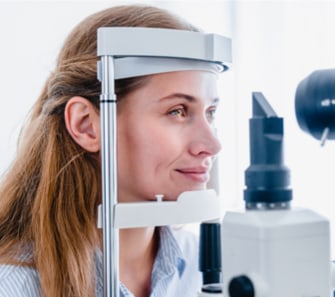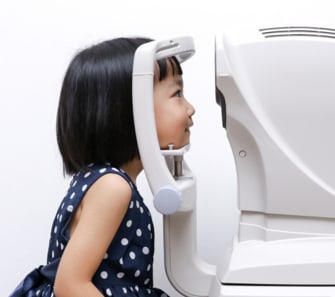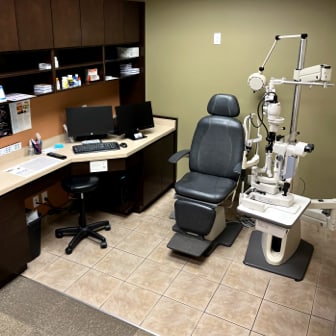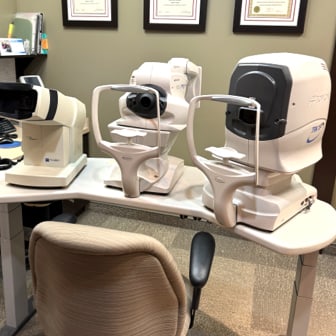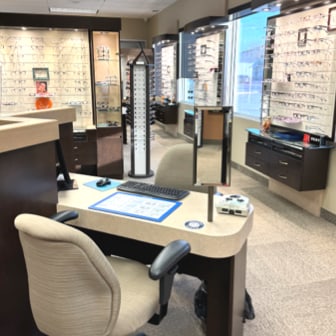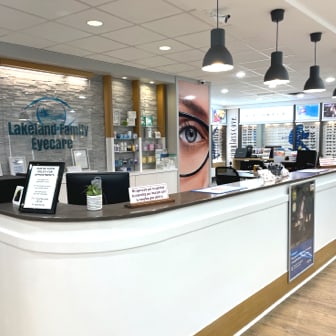
Eye Discomfort & Fatigue: Symptoms of a Modern Age
Did you know that the average Canadian spends nearly 11 hours a day looking at a digital device? From smartphones to tablets to TVs, these devices lead to eye fatigue and discomfort known as digital eye strain.
Despite the name, digital eye strain isn’t actually caused by the devices themselves. Instead, eye strain, whether digitally related or not, is caused by intense eye use. Some of the most common causes of eye strain include reading, writing, driving, and, of course, using digital devices.
Digital screens exacerbate eye strain because people tend to:
- Blink less while using computers.
- Use less than ideal posture & angles when on computers.
- Use screens with glare or reflection.
- Use devices with low contrast between text & background.
Digital eye strain symptoms can also be intensified by uncorrected eye problems like eye misalignment or refractive errors.
We can help alleviate the symptoms of digital eye strain.

What Can You Do to Prevent Digital Eye Strain?
There are a few easy changes you can make to your daily routines to reduce the strain on your eyes while using digital devices:
Some optometrists recommend using the 20-20-20 rule to give your eyes a much-needed break. Every 20 minutes, look at something at least 20 feet away for 20 seconds.
The Resting Point of Accommodation (RPA) is the distance from an object that your eyes need to focus comfortably. 15 to 27 inches is usually sufficient to provide comfort for most users.
Computer glasses are specifically designed to assist your eyes with viewing content on screens. These glasses also come with anti-reflective (AR) coating to reduce the glare on digital screens.
Other task-specific glasses are available to help your eyes focus at varying distances, like playing the piano or shooting. Please ask our doctors or staff about specialty glasses when you visit our clinic.
We recommend heavy computer users undergo regular eye exams, including children. Eye exams will uncover underlying eye problems that exacerbate digital eye strain.
Minimize glare by dimming the lights in your office, if possible. Excessively bright light exacerbates digital eye strain.
Position your computer screen away from bright light sources, such as windows. Reflections on digital screens can contribute to eye strain. Remember to regularly clean your screen with a monitor-safe cloth to remove dust and smudges.
Adjust your colour and contrast tones to suit your eyes and surroundings. If you catch yourself squinting at your screen by day’s end, consider increasing the font size for improved visibility and comfort.

Should You Worry About Digital Eye Strain?
Fortunately, digital eye strain doesn’t commonly lead to long-term consequences. However, when it comes to your overall eye health, it’s important to be proactive. If you’re experiencing digital eye strain symptoms, we recommend making the necessary changes to reduce demand on your eyes. Then call us to book an eye exam to rule out underlying problems.

Our Brands







Find Us In Bonnyville & St. Paul
Bonnyville
On the corner of Main & 52nd St, across from Westline Autowash.
As you may already be aware, Alberta Health Services has recently cut back coverage on optometry services. These changes were unexpected. We are extremely disappointed with their decision and how they handled bringing about this change.
To maintain the high quality of care that you have come to expect at our clinic, there will now be a fee for most eyecare services that were previously fully covered by AHS. If you would like to know how this affects you, please call our clinic at 780-826-4437 and one of our team members would be happy to assist you. You are also welcome to contact your local MLA to voice any concerns you may have with these changes in coverage.
Thank you for your understanding and your continued support.
- 5201 50 Avenue
- Bonnyville, AB T9N 2G6
- Phone: 780-826-4437
- Fax: 780-826-4267
- Monday: 8:00 AM – 5:00 PM
- Tuesday: 8:00 AM – 8:00 PM
- Wednesday: 8:00 AM – 8:00 PM
- Thursday: 8:00 AM – 5:00 PM
- Friday: 8:00 AM – 2:00 PM
- Saturday: Closed
- Sunday: Closed
St. Paul
You can find us on 51st Avenue, next to the Fire Hall.
As you may already be aware, Alberta Health Services has recently cut back coverage on optometry services. These changes were unexpected. We are extremely disappointed with their decision and how they handled bringing about this change.
To maintain the high quality of care that you have come to expect at our clinic, there will now be a fee for most eyecare services that were previously fully covered by AHS. If you would like to know how this affects you, please call our clinic at 780-645-3790 and one of our team members would be happy to assist you. You are also welcome to contact your local MLA to voice any concerns you may have with these changes in coverage.
Thank you for your understanding and your continued support.
- 4916 51 Avenue
- St. Paul, AB T0A 3A0
- Phone: 780-645-3790
- Fax: 780-645-2830
- Monday: 8:00 AM – 5:00 PM
- Tuesday: 8:00 AM – 8:00 PM
- Wednesday: 8:00 AM – 8:00 PM
- Thursday: 8:00 AM – 5:00 PM
- Friday: 8:00 AM – 2:00 PM
- Saturday: Closed
- Sunday: Closed

Our Blog
MacuMira: A New, Innovative Treatment for Dry AMD
Dry AMD, MacuMiraIf you’ve been diagnosed with dry age-related macular degeneration (AMD), you know how frustrating it can be when reading becomes harder or faces start looking blurry. You may feel limited in your options, especially if you want to maintain your independence and enjoy daily activities. Lakeland Family Eyecare understands these challenges and offers innovative solutions […]
Read More… from MacuMira: A New, Innovative Treatment for Dry AMD
Pink Eye vs Stye: What’s the Difference?
Eye Conditions, Eye HealthA red, swollen, and uncomfortable eye can be alarming, and it’s common to wonder what’s causing the irritation. Many people confuse pink eye and styes because they share similar symptoms, but they are very different conditions. Often, other issues are mistaken for pink eye, which is why a proper diagnosis is so important. The key […]
Eye Is Hurting when I Blink: 5 Possible Causes and When to See a Doctor
Eye Care, Eye Exams, Eye HealthFeeling a sharp pain or discomfort every time you blink is hard to ignore. It can make it difficult to focus on work, read, or even just relax. If your eye hurts when you blink, it could be a sign you need emergency eye care, and you’re likely looking for answers. The discomfort often comes […]
Read More… from Eye Is Hurting when I Blink: 5 Possible Causes and When to See a Doctor
MacuMira: A New, Innovative Treatment for Dry AMD

If you’ve been diagnosed with dry age-related macular degeneration (AMD), you know how frustrating it can be when reading becomes harder or faces start looking blurry. You may feel limited in your options, especially if you want to maintain your independence and enjoy daily activities. Lakeland Family Eyecare understands these challenges and offers innovative solutions […]
Read More… from MacuMira: A New, Innovative Treatment for Dry AMD
Pink Eye vs Stye: What’s the Difference?

A red, swollen, and uncomfortable eye can be alarming, and it’s common to wonder what’s causing the irritation. Many people confuse pink eye and styes because they share similar symptoms, but they are very different conditions. Often, other issues are mistaken for pink eye, which is why a proper diagnosis is so important. The key […]
Eye Is Hurting when I Blink: 5 Possible Causes and When to See a Doctor

Feeling a sharp pain or discomfort every time you blink is hard to ignore. It can make it difficult to focus on work, read, or even just relax. If your eye hurts when you blink, it could be a sign you need emergency eye care, and you’re likely looking for answers. The discomfort often comes […]
Read More… from Eye Is Hurting when I Blink: 5 Possible Causes and When to See a Doctor



